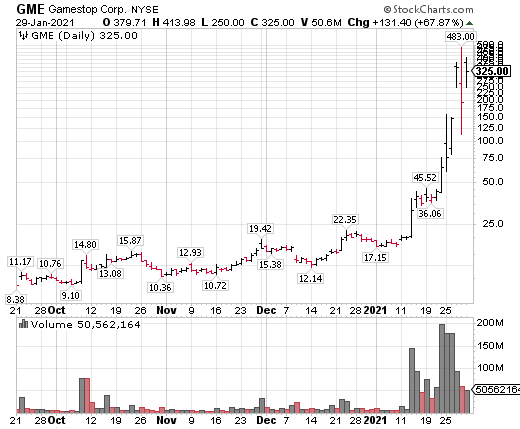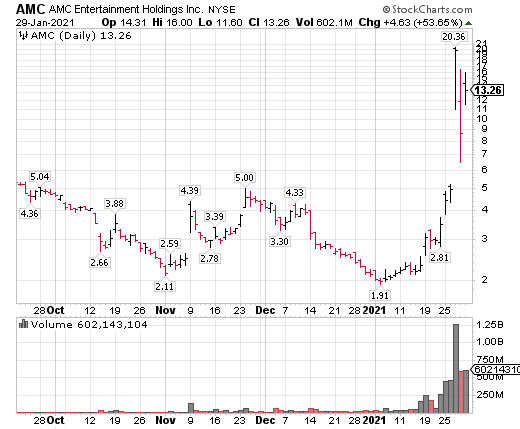Retail Traders Inflict Pain On Hedge Funds
Last week investors were reintroduced to the terminology of 'short squeeze' and 'gamma squeeze'. It has been some time since the phrase gamma squeeze was bantered about as much as it was last week as the volatility in a few stocks captured headlines. Stocks like GameStop (GME) and the movie chain AMC Holdings (AMC) saw their stock prices swing widely, but mostly to the upside. So what is going on with a few stocks like this.
Let me first note the type of trading activity occurring in these stocks is akin to gambling, it is highly risky and the odds are stacked against investors that are getting involved at this point in time. What took place last week were participants in an online Reddit forum, WallStreetBets (WSB), promoted purchasing the same stocks, GME and AMC to highlight a couple of the stocks. The forum members focused on these holdings, and I am going to focus on GME, as they uncovered the fact hedge funds had heavily shorted GME in anticipation that the stock price would fall. In particular, Melvin Capital had a large GME short position. Sunday's Wall Street Journal highlighted the impact to Melvin Capital in an article titled, Melvin Capital Lost 53% in January, Hurt by GameStop and Other Bets ($$).
When an investor shorts a stock they sell it at its current market price with the intent of buying the stock back at a lower price. In other words it is a bet that the stock is going down. To sell the shares short, one needs to borrow them from an investor that holds the shares. Additionally, the percentage shorted in GME was greater than 100% of the stock's float. When the short transaction is reversed, the short seller buys back the shares, returns them to the lending shareholder or institution along with a fee representing the cost to borrow the shares.
What was also occurring were investors, many driven by the discussions on WSB's forum, began purchasing the stock. Additionally, WSB investors and others bought call options on the stock, lets say out of the money (OTM) calls. An OTM call option means the strike price was higher than the underlying stock's price. If one owns a call option, it gives the owner of the call the right to purchase the stock at a certain exercise price.
Often, it is a market maker who sells the call option to the call buyer. The goal of the market market is simply to make a fee on selling the call option to the buyer. The market maker purchases GME stock in an amount necessary to eliminate or hedge his risk of being short the option. This is where the terminology gets technical or Greek. The amount of stock the market maker purchases is based on the 'delta' of the option contract when delta hedging. If the delta is .5, it means for every $1 increase in the stock price, the option increases by $.50. The higher the delta the more shares the market maker must hold to hedge his short option position. As the price of the stock gets closer to the option's exercise price, the delta increases, say to .75. In this case the market maker purchases more of the underlying stock referenced by the option, GME in this case. The rate of change of the delta value is referred to as gamma. As investors (WSB participants) buy more GME, the stock price increases, the option delta increases and if the stock price is moving up quickly the gamma increases, thus forcing the market maker to purchase more stock which places additional upside pressure on GME resulting in what is referred to as a gamma squeeze, i.e., a delta that is increasing at an increasing rate.
The hedge fund that is short the stock might be forced to buyback the shares, GME, as the price rises due to margin calls. Alternatively or simultaneously, the hedge fund can sell stock that it holds long. Last week, the selling of stock that was held long appeared to be occurring in the stock of some companies. But, if the hedge fund is buying back the stock, GME, this places upward pressure on the stock price as well; hence, a short squeeze.
At the moment this activity seems concentrated in a small number of stocks. One fact that tends to ultimately occur is the fundamentals of a stock ultimately get reflected in a stock's price. With respect to GME, the company has not generated positive earnings per share in any of the last three years, assuming the year ending 1/31/2021 ends in a loss as well. Continued individual stock volatility is likely in the weeks ahead though. Reuters highlights a Goldman Sachs (GS) comment noting, "According to Goldman Sachs Prime Services, this week [week of 1/25/2021] represented the largest active hedge fund de-grossing since February 2009. Funds in their coverage sold long positions and covered shorts in every sector. Despite this active deleveraging, hedge fund net and gross exposures on a mark-to-market basis both remain close to the highest levels on record, indicating ongoing risk of positioning-driven sell-offs."
Disclaimer: The information and content should not be construed as a recommendation to invest or trade in any type of security. Neither the information nor any opinion expressed constitutes a ...
more





Yes we have, and will continue to do so this week.